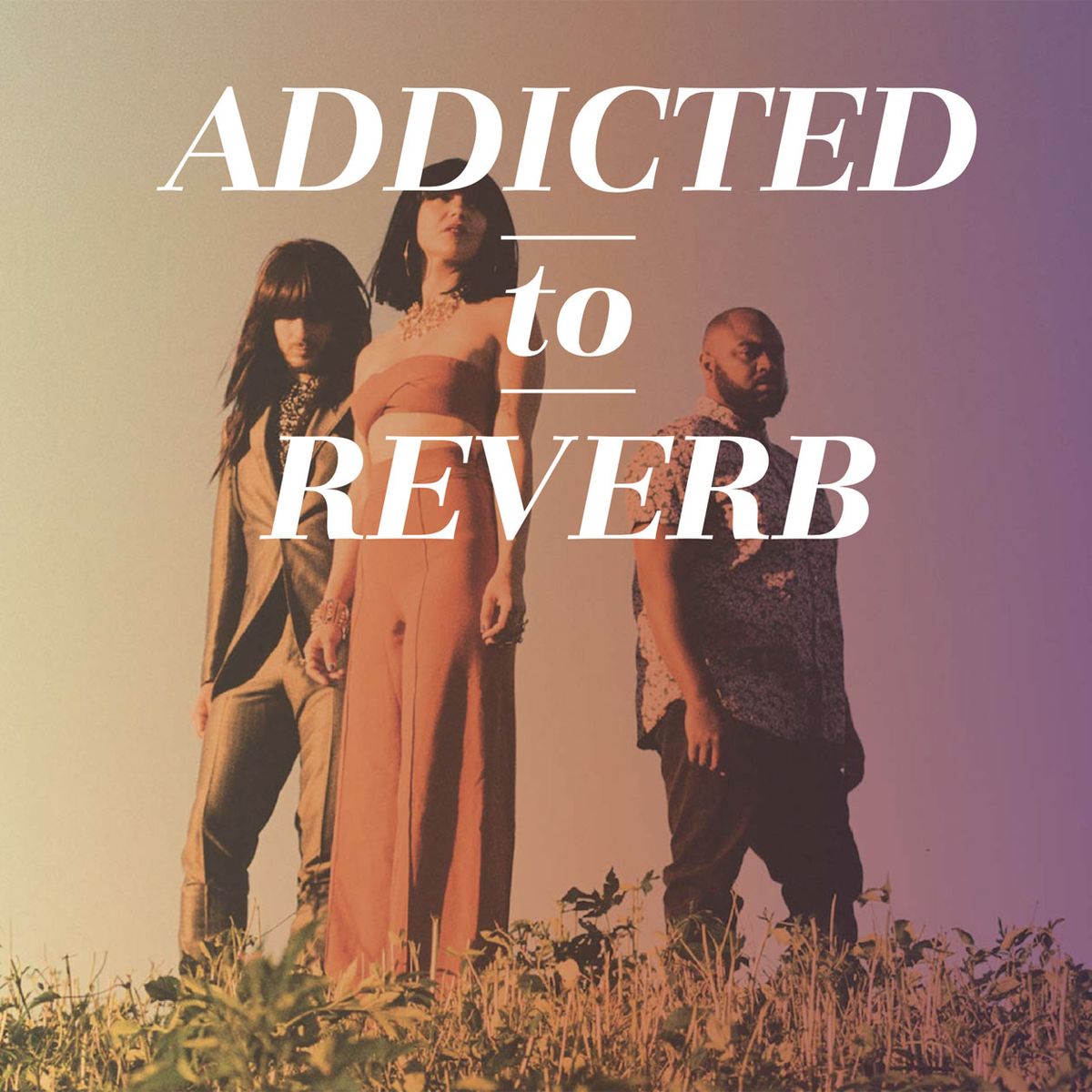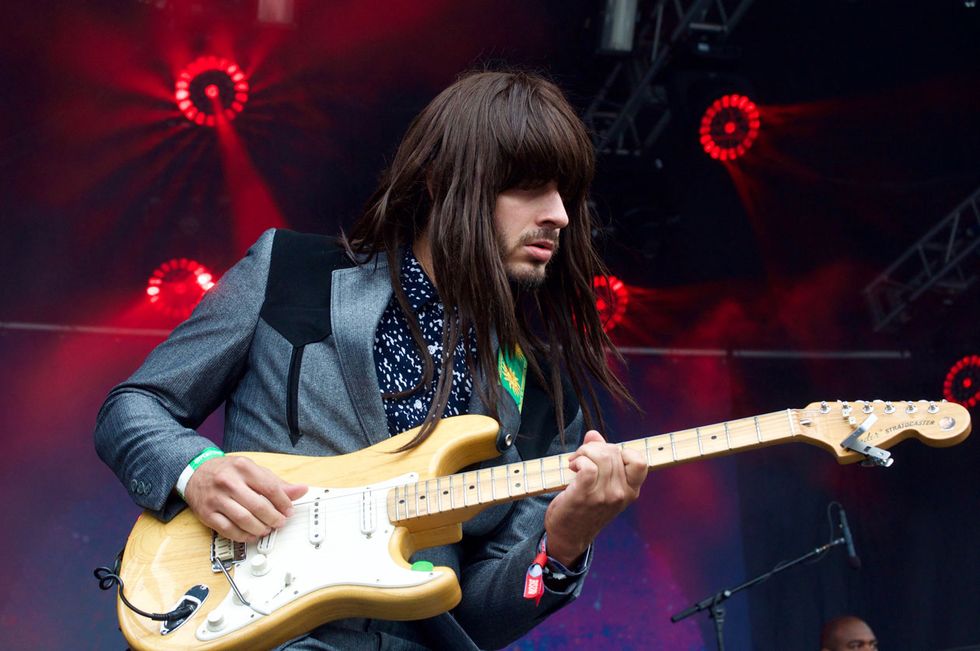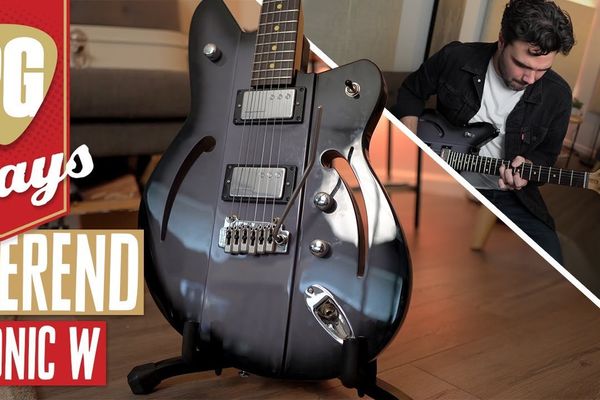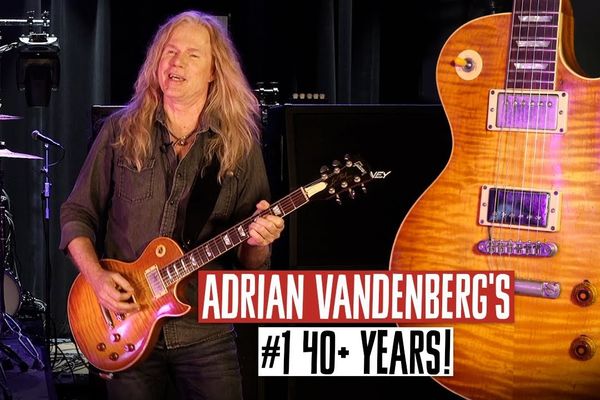The polymorphic plectrist surfs the world to create the diverse sounds on his instrumental trio’s new album, Con Todo El Mundo.
The most unique and intriguing players often travel a very unconventional musical path. Mark Speer, sole guitarist of the reverb-drenched instrumental trio Khruangbin, is such a musician. He dodges rock ’n’ roll’s influence, prefers crafting his compositions on bass and drums, and continues to nurture a place in his heart for music in foreign languages. He, along with bassist Laura Lee and drummer Donald Johnson (aka D.J.), has managed to mold a slew of non-guitar influences into a 6-string style that makes Khruangbin’s sophomore release, Con Todo El Mundo, an extremely fascinating listen for fans of instrumental guitar music as well as anyone who appreciates loungy, old-school grooves and exquisitely crafted melodies.
On Khruangbin’s debut album, The Universe Smiles Upon You, the melodic concepts and phrasing of Thai funk played a premier role in shaping the sound.
As if to illustrate Khruangbin’s globe-trotting character, when Premier Guitar caught up with Speer, he was enjoying a day off in India before beginning a tour through Europe. And through our conversation it became extremely apparent why Con Todo El Mundo, which translates as With All the World, is a fitting way to describe Speer’s musical journey, his band’s surf-and funk-tinged sound, and why Khruangbin still records in a dirt-floor barn outside of Houston, Texas.
What were your first musical inspirations?
I was born in 1979, so I came to consciousness about the time MTV was in its first couple years. The first video I remember seeing on MTV was Grandmaster Flash’s “The Message.” Hearing the Sylvia Robinson production on that tune was, like, “What is this? This is amazing! How do you make sounds like that?” But I was not, not into rock ’n’ roll. I thought it was terrible.
With your early attraction to hip-hop and aversion to rock, what initially inspired you to pick up the guitar?
To be honest, I wanted to play drums because drums just looked like so much fun. But I couldn’t afford drums, so I played bass. At a certain point, a friend’s dad let me borrow a 4-track cassette recorder. I was making songs and tracks with Casio drums, playing them with my fingers. I wanted to have chords on them, but I didn’t have a guitar. I would slow the tape down and play them on bass, then speed the tape back up.
So I borrowed my buddy’s guitar and learned some chords. I wanted to play big jazz chords, like fusion-jazz type chords. So those were the first chords I learned. I didn’t know how to play power chords or use distortion or anything like that. That came much, much later.
You have a unique guitar sound and style. It’s amazing you came to it from such a pragmatic standpoint.
Yeah, I just wanted to make chords.
So how did you transition from reluctantly playing guitar to putting Khruangbin together?
I used to play bass, but I got more work playing guitar, and I had to pay my bills. Then I got better at that tool, I guess. Then, Laura Lee started playing bass through insomnia. She’d wake up in the middle of the night and start playing bass. She was like, “I want to start a band.” So we started jamming. I wanted to play drums again, so I’d play the kit and she’d play bass. And we’d record everything thinking that we’d find a guitar player. But eventually we decided I should play guitar.
Then we got a gig, and it was like, “We need a drummer, and we need a name for a band!” So we asked D.J. He was an organist, but he could play anything onstage: organ, bass, drums, whatever. I told him, “It’s basically just classic breakbeats. Just keep it simple and keep it moving.”
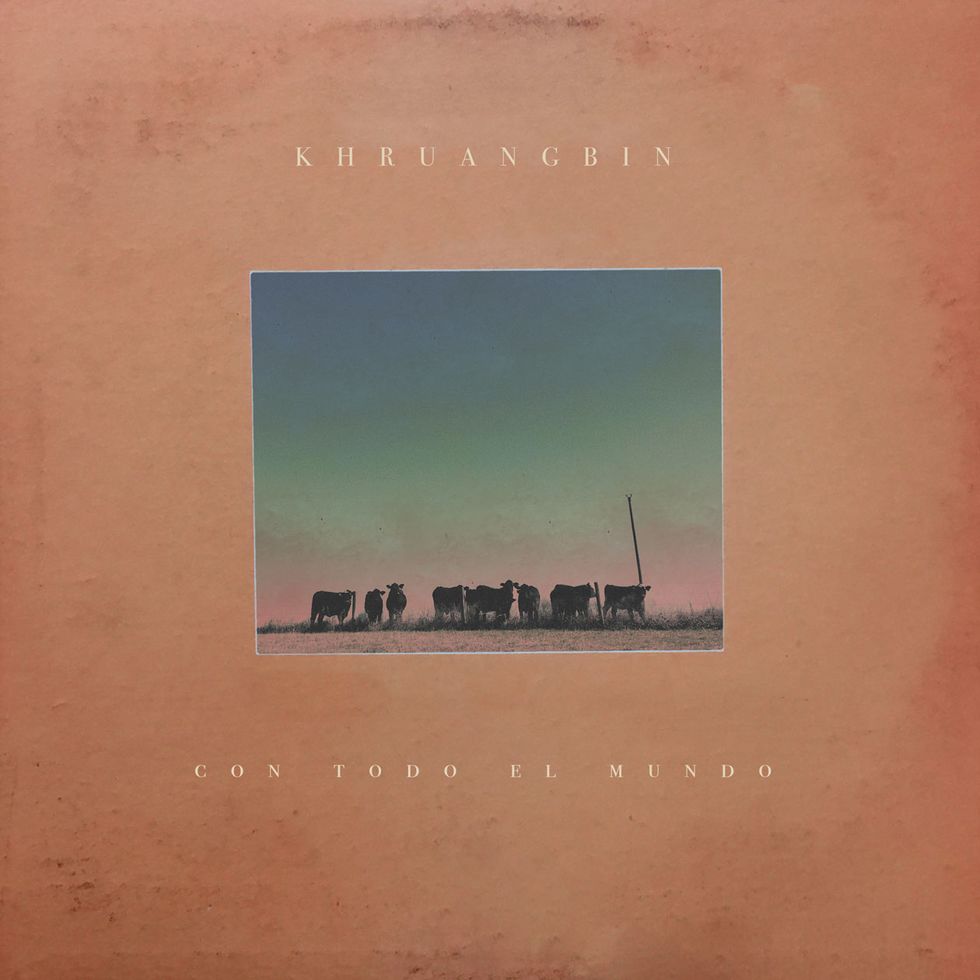
TIDBIT: Khruangbin records most of their albums in a barn in Burton, Texas, and then do overdubs at Houston’s SugarHill Recording Studios.
You had a bass player who had just learned to play, a guitar player who wanted to play drums, and a drummer who was an organist. That’s a strange recipe.
Yes. That is correct. [Laughs.]
The band is now on its second album, Con Todo El Mundo. How do you feel you have progressed since your debut?
We were listening to a lot more stuff. A lot of people like to call us Thai funk, which is kind of funny. Because in no way are we playing strictly Thai funk. We’re not playing strict luk thung or strict mor lam or any of those regional styles. We try to piece together all the different types of music that we like into this big synergistic thing. And that’s what The Universe Smiles Upon You was.
But for Con Todo El Mundo, we’re adding even more stuff that we’ve been listening to. The new record is much more influenced by music from the Middle East, North Africa, Spain, and even the Western Coast of Ireland. That’s what we’re pulling from. A lot of the scales and grooves that we’re pulling from are Iranian and Persian in nature, but share a lot of tonality with North African, Mediterranean, Spanish, and Irish music.
Khruangbin’s Mark Speer, caught here at the 2017 Outside Lands festival in San Francisco, plays only one guitar: a 2001 Fender Strat modified with a Graph Tech TUSQ nut and DiMarzio Cruiser pickups in the neck and bridge.
Photo by Rich Osweiler
Did you track the album in Houston?
The band was formed in Burton, which is a little town outside of Brenham, which is where Blue Bell Ice Cream comes from. We still record there now. It’s just out in the middle of nowhere. You can be isolated from the noise of the city. There’s hardly any cell phone service. There’s no Wi-Fi, that’s for sure. We play in a barn. You can open up all the doors and let the wind go through and look out and see the cows.
Now when you say barn…
It’s like dirt floors and corrugated tin siding. If you open up the doors, the sound is a lot more dry. And if you close the door, you get a lot more room sound. So you can change it up depending on what you’re trying to do. Everything is tracked in the barn, live. There’s no punch-ins or overdubs that are done there. We do overdubs in Houston at SugarHill Recording Studios. But everything is done in the barn, as far as bass, drums, and guitar.
How are you able to get such a focused sound with the bass and drums in that barn?
I don’t know if it is very focused. We even try to mic the bass amp. She’s using a Bassman 10, which is like a Fender 4x10 from the late ’60s to mid ’70s. The reason we like it is that it doesn’t do what modern bass amps do, which is scoop out all the mids. The highest treble you get is around 6k. The treble you hear is fingers. It’s character.
What amp or amps do you record with?
My blackface Deluxe Reverb reissue from ’96, or something. It’s one of the beige covered ones. It’s got a brown screen, a black face, and is covered in beige tolex. It’s been beat to absolute hell. That one won’t go on the road with me, simply because it’s so ugly. [Laughs.] But it sounds amazing.
I am guitar players.”
The amp I take on the road in the States is the [’68 Custom Deluxe] silverface reissue from just a couple years ago. That one looks fantastic and matches Laura Lee’s bass amp. But that doesn’t sound nearly as good as my old blackface. I’ve actually been considering taking the guts from the blackface and sticking them into the silver.
Other than reverb, your guitar tone seems fairly straight-into-the-amp.
My preferred setup is my guitar into a Cry Baby wah that I never turn off. It’s usually toe-down, in its most trebly region, so if I have to switch it on, it doesn’t change the tone so drastically. And then it goes from there into a Boss DS-1. And then it goes from that into an Electro-Harmonix Holy Grail.
But when we mixed the records, all the delays and stuff were done in the mix. So when we do a show, I have a Strymon El Capistan for delay with an expression pedal hooked up to the back. There’s also a Nose volume pedal. It’s like a volume knob that allows me to move it with my feet on the board. Also, sometimes I like to use a really, really slow vibrato at the end of the chain to change the pitch. Right now, I have a Chase Bliss Warped Vinyl on it. It sounds really psychedelic and warpy. But honestly, I wish I could go back to the wah and DS-1 and that’s it.

Guitars
2001 Fender Stratocaster (Graph Tech TUSQ saddles and DiMarzio Cruiser pickups)
Amps
Fender ’65 Deluxe Reverb reissue
Fender ’68 Custom Deluxe Reverb reissue
Effects
Boss DS-1 Distortion
Boss PH-3 Phase Shifter
Electro-Harmonix Holy Grail Reverb
Dunlop Cry Baby wah
Nose volume pedal
Chase Bliss Warped Vinyl analog vibrato/chorus
Strymon El Capistan dTape Echo
Strings and Picks
D’Addario Chromes Flatwounds, custom with unwound G (.010, .012, .016, .024, .032, .042)
Extremely worn Dunlop Tortex .88 mm picks
On “Evan Finds the Third Room” from the new album, there’s a great-sounding phaser effect. Was that done in the mix?
I think it’s a Boss PH-something. It’s the green one. I love phaser. It’s one of my favorite effects in the whole world. I got it on the new record on a couple cuts.
Tell me about your Strat.
I got that one back in 2001 or 2002. It’s basically the only guitar I have. I replaced the neck pickup with a DiMarzio Cruiser because it buzzed too much. And I did the same thing in the bridge position so I could get some screaming leads. [Laughs.] The frets have been replaced two or three times. The saddles are TUSQ, which is great, because I hate changing my strings. I just don’t like the way new strings sound. That’s why I like flatwounds. Once they’re broken in, they’re going to sound like that until they break. And I wired [the Strat] wrong in position two. So it has this Sears, Teisco-type of vibe. It actually sounds really great. I love it.
Does that sound make it to the albums?
Oh yeah. It’s all over the place. That’s the tone of “Two Fish and an Elephant” [on The Universe Smiles Upon You].
Your guitar tone is dominated by huge washes of spring-sounding reverb. What draws you to that sound?
I think it’s the fact that it fills up the sound. There’s only three of us, so I’m using ambient effects like reverb and delay to fill it out. But I don’t actually use the amp’s reverb because I’m on the road so much. I don’t ever know what kind of amp I’m going to get when I’m out of the country. So I just use the Holy Grail. I have it around noon to 1 o’clock and leave it there. It’s on the spring setting.
I don’t know if you’ve listened to a lot of Indian music, but a sitar kind of has a built-in reverb. So does a rabab from Afghanistan. It creates this mystical kind of vibe. So reverb’s a huge part of what I do.
I’ve always been into digging for music that’s not in English. That’s because with music in other languages, I don’t know what they’re saying. So what moves me is the melodies and how they’re singing and the intensity behind it. And in that sense, it achieves a lot of the same stuff as instrumental music. It’s just an amazing melody delivered in a captivating way.
Me and Laura Lee found Thai music through a blog, called Monrakplengthai, which means “I Love Thai Music.” We kind of got obsessed with this stuff and made mix CDs.
You translate that beautifully on the new Khruangbin album. There are vocals on the majority of tracks, but the voice is utilized as more of an instrument.
Yeah. It’s an atmospheric kind of thing. In Khruangbin, the guitar is taking the place of the lead singer. And so with that, I’m listening to a lot more singers than I am guitar players. There are a lot of guitar players that I love. But I’m specifically trying to make it sing.
Khruangbin performs “Maria También” from Con Todo El Mundo live on Santa Monica’s KCRW. Note how Speer’s guitar solo, at 1:46, puts his Middle Eastern influence front and center, yet still—thanks to his generous use of reverb and accent on melody—displays a surf-guitar resonance.
